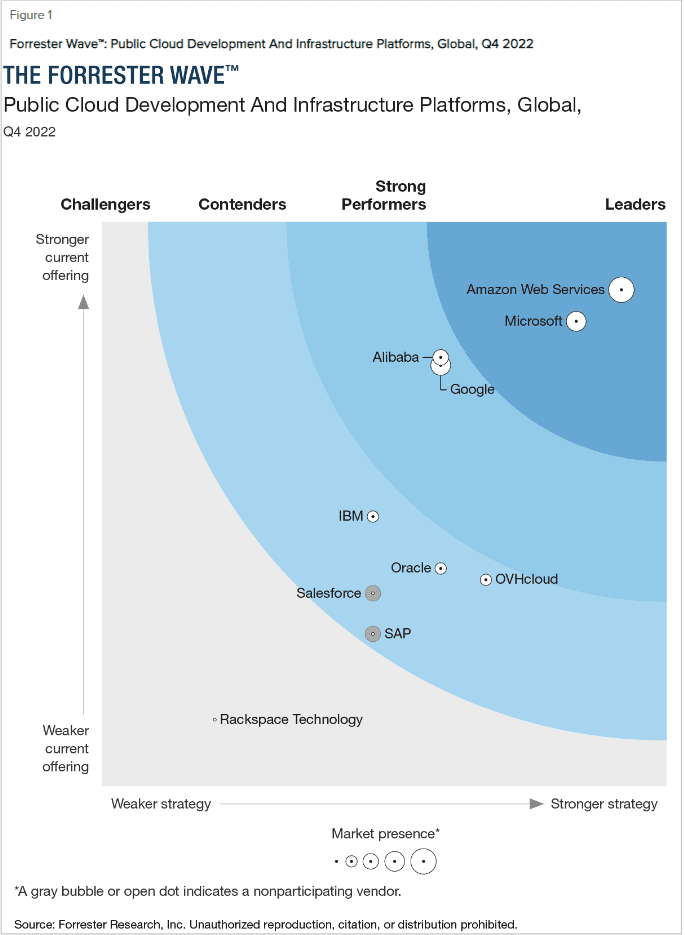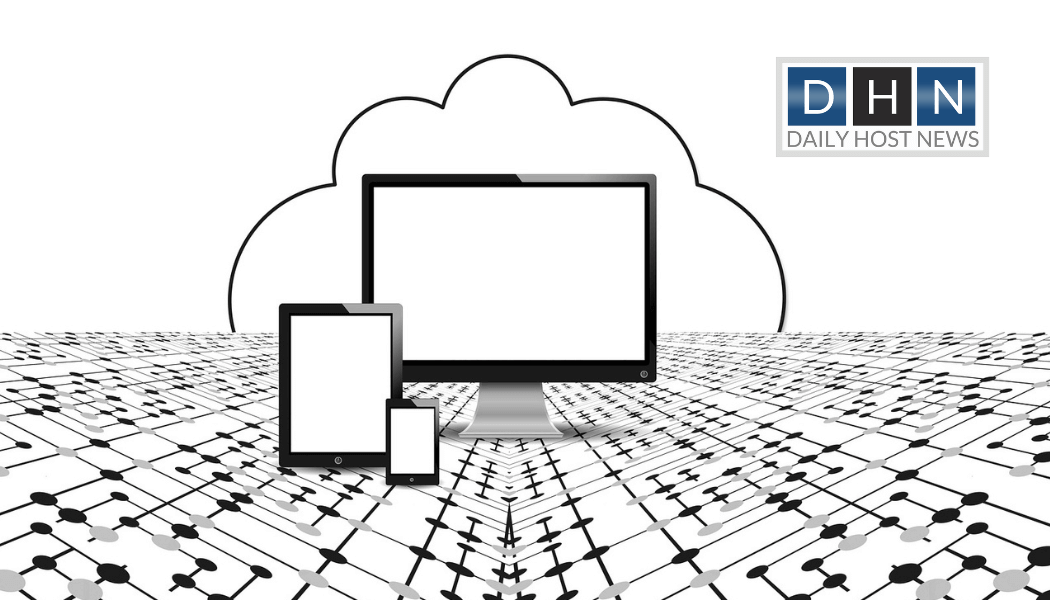As the cloud becomes everyday IT, customers of public cloud development and infrastructure platforms look for providers that offer cloud-native operations platforms with automation, support a range of application development platforms, and make it easier to adopt AI/ML and big data analytics.
In Q4 2022, The Forrester Wave™ evaluated 10 vendors against 33 criteria grouped into three categories – current offerings, strategy, and market presence and highlighted the Leaders, Strong Performers, Contenders, and Challengers.
Read on to know more about them.

10 public cloud development and infrastructure platform vendors
Amazon Web Services
Amazon Web Services is the leader in this Forrester evaluation. It leads the market with a big focus on hardware. AWS entered the cloud market early, has a large market share, and is innovating at a fast pace.
AWS has differentiated itself from competitors by investing in hardware, including microchips and wireless capabilities. It offers enterprises a range of capabilities that supplement on-premises infrastructure and enables customers to achieve capabilities at a global scale.
Forrester’s evaluation showed that AWS is a good choice for compute capabilities, from low-cost Graviton ARM chips to the security-focused Nitro System to Inferentia and Trainium chips for machine learning. AWS also provides gear for private 5G with Wavelength as well as Outposts hardware for on-premises computing. However, customers may seek standardization around open-source, cloud-native technologies, which AWS will have to adapt to.
Microsoft
Microsoft is also the leader in the Forrester Wave report. The Forrester evaluation shows that Microsoft’s efforts are impactful. Microsoft is trying to be the best at managing hybrid and multi cloud environments with the Azure Arc, Azure Monitor, Azure Advisor, and Azure Kubernetes Service. Microsoft uses both virtual machines and containers to develop applications, from mobile apps to toolchains for continuous integration and delivery. To reach its goals, it needs better wireless communications and more types of compute instances.
Customers who have used Microsoft’s services praised the company’s improvements and partnerships but said they want to know more about what Azure can do. Microsoft is a good choice for customers who want highly integrated enterprise IT infrastructure.
Alibaba Cloud
Alibaba emerged as a strong performer in the Forrester evaluation. It leverages open source for comprehensive capabilities. Its key to success is that it has embraced open-source, cloud-native technologies based on Kubernetes while ramping up the capabilities of its data center chips.
Alibaba is trying to provide both general hyperscale cloud capabilities and also platform-oriented services. Alibaba customers can use the company’s investments in compute, from ARM chips to graphics processing units (GPUs). AI/ML services are especially good because they offer prebuilt models, tools, and templates. Plus, the explainability of the results helps improve trust.
Google is also a strong performer according to Forrester. Google is strong technically, but it needs to improve its strategy for businesses. Google helped move computing to the cloud by contributing to the Kubernetes project.
Google releases new services regularly, which impacts other companies and causes Kubernetes and similar projects to become more popular in enterprise-level IT.
Google has improved how it helps people move to the cloud. It is also good at data insights and analytics, with Vertex AI offering services that make it easier to use AI. This includes prebuilt solutions such as Document AI and MLOps for deployment and low-code offerings. Google’s storage and network capabilities are also strong.
Google is a good choice for customers who prioritize data insights/analytics, AI, scale, and cloud-native products.
Oracle
Oracle is a contender in the Forrester Wave report. Oracle Cloud Infrastructure (OCI) has a three-part strategy: to encourage longtime customers to move on-premises workloads to Oracle, to focus innovation on OCI cloud databases, and to use open source infrastructure and development to generate revenue around non-Oracle workloads with cloud-at-customer solutions focusing on low latency or regulatory workloads.
The MySQL HeatWave is one of OCI’s strongest offerings. It is a database for online transaction processing and online analytical processing which is based on a massively scalable query accelerator. However, there are some things that OCI needs to improve, including automated modernization services, edge support, and CI/CD toolchains.
OVHcloud
OVHcloud, a contender in the Forrester evaluation, is becoming more popular because it offers data sovereignty, but it needs to improve its services to keep up with demand. OVHcloud has made AI/ML a priority to meet the needs of enterprises that require data processing and analysis in a sovereign cloud environment. By hosting VMware workloads, offering managed Kubernetes services, and supporting hybrid architectures, OVHcloud provides a practical approach to modernization.
OVHcloud has a smaller number of services than some of its competitors, but it offers the ones that are most important to many customers, including high-performance computing. OVHcloud’s cloud migrations can be reversed if customers are worried about being locked in with one vendor.
Customers who spoke highly of OVHcloud praised its global commitment to data sovereignty and partnership but said they would like the company to be more timely in matching services available on other platforms. Overall, OVHcloud is a good option for customers seeking sovereign cloud services, especially in Europe.
Salesforce
Salesforce was also placed as a contender by Forrester. Salesforce has been doing well with CRM and set a good example for others in the industry by providing a flexible and customizable solution for different market segments. To keep other companies from taking their place, Salesforce bought some other companies so it could offer more services. Now Salesforce’s Hyperforce offering uses the big cloud providers as infrastructure to help it reach more customers.
Salesforce did well in AI/ML and analytics and data integration and governance. However, Salesforce is not as good in enterprise application hosting and edge/IoT solutions. To make sure it keeps its role as an enterprise cloud provider, the company should make more of its infrastructure operations platform available through the Kubernetes control plane.
IBM
The Forrester wave report places IBM as a contender in its evaluation of public cloud development and infrastructure platform vendors. IBM is continuing to develop its industry cloud offerings, but it needs to improve its core offerings as well. IBM has been focusing more on specific sectors, such as financial services, and using tools like OpenShift from Red Hat to offer multi cloud capabilities.
IBM Cloud’s strengths include the Code Engine which conforms to the open-source Knative project for serverless functionality and Cloud Functions for enabling complex workflows. IBM Cloud offers good developer experience and application development capabilities for mobile services. Its security offerings and data integration components are also noteworthy, offering multiple connectors for any cloud.
IBM is a good option for companies that want to use multiple cloud providers and modernize their mainframe systems.
SAP
SAP is also a contender in this Forrester report. In the data center era, SAP became a very large and successful company with its complex applications running on powerful hardware. With the advent of cloud computing, new opportunities for scale and power became available, so SAP developed its platform called the Business Technology Platform (BTP) to take advantage of these capabilities. The BTP provides extensive capabilities for application development, AI/ML, analytics, and more.
SAP needs to make BTP stronger to keep up with the move to cloud-native however, it did well in data insights and analytics criteria. SAP BTP is a good choice for customers who want to improve their SAP environments with cloud-native infrastructure and development.
Rackspace Technology
Rackspace Technology was the challenger in this Forrester Wave report.
Even though it enables cloud adoption, it needs to expand its cloud. Rackspace Technology is a cloud services provider that is known for its high level of engagement. It also offers its OpenStack-based infrastructure as well as services from the hyperscalers. This helps in tailoring cloud solutions to customers seeking implementation support and beyond.
Rackspace Technology’s biggest gap is data insights and analytics, where it couldn’t offer comparable services as other vendors. Edge and hybrid capabilities are especially important for Rackspace Technology. This is because the hyperscalers must focus on all-purpose solutions, while more nimble competitors can capture key accounts. Rackspace Technology is a good fit for customers who are looking for a services-focused vendor for multi cloud environments.
Source: Forrester
Read next: Veeam report highlights what IT leaders must know about cloud protection in 2023








